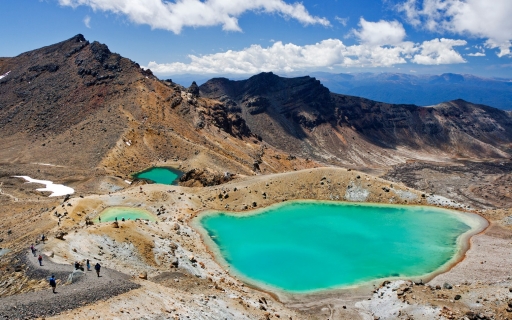Arthur's Pass, New Zealand - Weather and Climate
The temperature in Arthur's Pass, Canterbury, New Zealand can vary quite a bit throughout the year.
Temperatures can be mild during the warmest months,
and cold during the cooler months.
It also has a notably wet climate with much precipitation.
Let's now guide you through the climate details for a complete overview.
Average maximum day and minimum night temperature
Visitors to Arthur's Pass can expect significant temperature changes throughout the year. Average maximum daytime temperatures range from a moderate 17°C in February, the warmest time of the year, to a chilly 5°C during cooler months like July.
At night, temperatures typically drop to an average of around -2°C during these months.Check out our detailed temperature page for more information.
Temperature ranges by month
Precipitation and rainy days
Arthur's Pass is known for its substantial rain/snowfall, with annual precipitation reaching 2783 mm. Year-round, Arthur's Pass has a balanced climate with minimal variation in precipitation. The difference between the wettest month, October, with 294 mm, and the driest month, July, with 192 mm, is minimal.
The mean monthly precipitation over the year, including rain, hail and snow
Sunshine over the year
Seasonal changes in sunshine hours are quite dramatic in Arthur's Pass. While January receives considerable daily sunshine with up to 7.0 hours, June marks the darkest time of the year, where sunshine is scarce with only 3.6 hours of sunlight per day.
Visit our detailed sunshine hours page for more information.
Monthly hours of sunshine
Daily hours of sunshine
Average humidity
The city experiences its highest humidity in February, reaching 84%. In August, the humidity drops to its lowest level at 81%. What does this mean? Read our detailed page on humidity levels for further details.
Relative humidity over the year
Forecast for Arthur's Pass



Select a Month of Interest
Check the conditions for any month of the year.
The best time of year to visit Arthur's Pass in New Zealand
The average rainfall figures in Arthur's Pass are quite high. Throughout the year, you have a chance of prolonged precipitation. So no matter what time of year you go, you will always have to deal with a high number of rainy days. This makes it more challenging to point out the best time of year to visit. If we needed to pick one month we would choose January which is the sunniest month of the year.Other facts from our historical weather data:
February has an average maximum temperature of 17°C and is the warmest month of the year.
The coldest month is July with an average maximum temperature of 5°C.
October tops the wettest month list with 294 mm of rainfall.
July is the driest month with 192 mm of precipitation.
January is the sunniest month with an average of 211 hours of sunshine.
No idea where to travel to this year? We have a tool that recommends destinations based on your ideal conditions. Find out where to go with our weather planner.



